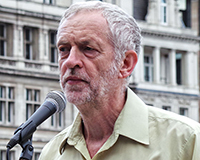 Jeremy Corbyn has been announced as the new leader of the Labour Party. He is arguably the most high-profile politician with a property-centric agenda for many years.
Jeremy Corbyn has been announced as the new leader of the Labour Party. He is arguably the most high-profile politician with a property-centric agenda for many years.
The self-proclaimed socialist would like to see the introduction of rent controls, far greater affordable or social housing requirements for new developments, and restrict the sale of public assets, among other property-oriented policies.
This has provoked a negative reaction from the generally centre-right property market, which sees Corbyn’s policies as damaging to the industry and likely to exacerbate one of the main problems he is seeking to solve – the housing crisis.
“He believes capitalism is theft, so we know there will be many higher taxes for business generally and I suspect there would be particularly high taxes reserved for property, as we would be regarded as the lowest of the low. I think the industry would be decimated,” says Steve Norris, chairman of Soho Estates and BNP Paribas Real Estate UK and a former Conservative MP.
The introduction of rent controls, as well as clamping down on developers reducing their affordable and social housing stock through viability studies, could also diminish the supply of homes.
“Rent controls will be detrimental to housing supply as they will significantly deter the £30bn investment that is ready to enter the build-to-rent sector and boost housing levels,” says Melanie Leech, chief executive of the British Property Federation.
“Extending Right to Buy to private tenants will probably be downright unworkable. This policy is unlikely to be in accord with European Human Rights law,” she adds.
Such a left-wing stance could also scare off investment from outside the UK, with Corbyn ardently against the sale of public assets.
“Some of the major regeneration projects that need to go ahead are seriously big-ticket and we have to have all options on the table to enable us to deliver them. We cannot afford to limit ourselves or restrain foreign investment,” says Faraz Baber, executive director for policy at London First.
However, Corbyn’s policies have been offered some crumbs of support from the industry.
He has proposed “people’s quantitative easing”, which would see money printed in order to be invested in infrastructure and used to build new homes.
Tony Travers, director at the London School of Economics, says that while he thinks it is fundamentally a bad idea because of the inflationary effect it would have on the economy, it would be a short-term boon for the property community.
“It is hard to imagine that not feeding through into activity in the development industry more broadly as a result of a massive increase in infrastructure expenditure, which would be good for business,” he says.
The introduction of a national investment bank for the housing sector is also something that has been proposed by Corbyn. The bank would issue debt used by councils to develop housing and for the funding of infrastructure. The debt would be bought by the Bank of England.
“The national investment bank for housing, including affordable housing, is a policy to be welcomed. Initiatives such as this, and lifting local authorities’ borrowing cap, are positive as they are focused on increasing supply of housing, which is what we need the most,” says Leech.
Corbyn is not the most loved candidate in property circles, but as he appears to be destined to become the next Labour leader, the industry is likely to face loud criticism in the months to come.
Corbyn’s property policies
- Clamping down on development viability/ affordable housing assessments
- Extending Right to Buy to all large-scale landlords
- Ending Right to Buy for housing associations and social tenants
- Establishing a national investment bank for housing and infrastructure
- Placing rent controls on private landlords and lower social rents
- Lifting the revenue cap on the housing revenue account so local authorities can build homes
- Introducing a “use it or lose it”-style land value tax, focused on undeveloped land with planning permission
- Creating a register of landlords and licensing for landlords
- Replacing social housing with estate generation schemes like-for-like
- Preventing councils selling properties in high-value areas
- Building 100,000 social homes a year
- Redefining affordable housing to link it to income, not market prices
- Reversing permitted development rights/office-to-resi
- Preventing the public sale of infrastructure assets and companies
- Scrapping the bedroom tax
- Allowing social tenants the right to longer tenancies










